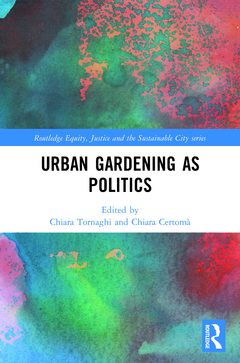Description
Urban Gardening as Politics
Routledge Equity, Justice and the Sustainable City Series
Coordinators: Tornaghi Chiara, Certomà Chiara
Language: English
Subjects for Urban Gardening as Politics:
Keywords
Community Garden; Urban Gardening; guerrilla gardening; Guerrilla Gardeners; Community gardening; Urban Agriculture; Urban Studies; Political Gardening; Sustainable urbanisation; Neoliberal City; Environmental justice; Disadvantaged Urban Neighbourhoods; Environmental studies; Social Reproduction; Urban Food Production; Food security; Urban Food; Urban geography; Allotment Sites; Sustainability; Food Sovereignty; Urban Food Movement; DIY Citizenship; Community Gardening Projects; Plot Holders; Urban Common; Scf; Environmental Issues; Urban Garden Movement; Urban Political Ecology; Urban Gardening Initiatives; Allotment Tenants; Food Box Programme; UK City
Publication date: 03-2021
· 15.6x23.4 cm · Paperback
Publication date: 08-2018
· 15.6x23.4 cm · Hardback
Description
/li>Contents
/li>Readership
/li>Biography
/li>
While most of the existing literature on community gardens and urban agriculture share a tendency towards either an advocacy view or a rather dismissive approach on the grounds of the co-optation of food growing, self-help and voluntarism to the neoliberal agenda, this collection investigates and reflects on the complex and sometimes contradictory nature of these initiatives. It questions to what extent they address social inequality and injustice and interrogates them as forms of political agency that contest, transform and re-signify ?the urban?.
Claims for land access, the right to food, the social benefits of city greening/community conviviality, and insurgent forms of planning, are multiplying within policy, advocacy and academic literature; and are becoming increasingly manifested through the practice of urban gardening. These claims are symptomatic of the way issues of social reproduction intersect with the environment, as well as the fact that urban planning and the production of space remains a crucial point of an ever-evolving debate on equity and justice in the city. Amid a mushrooming over positive literature, this book explores the initiatives of urban gardening critically rather than apologetically. The contributors acknowledge that these initiatives are happening within neoliberal environments, which promote ?among other things - urban competition, the dismantling of the welfare state, the erasure of public space and ongoing austerity. These initiatives, thus, can either be manifestation of new forms of solidarity, political agency and citizenship or new tools for enclosure, inequality and exclusion. In designing this book, the progressive stance of these initiatives has therefore been taken as a research question, rather than as an assumption.
The result is a collection of chapters that explore potentials and limitations of political gardening as a practice to envision and implement a more sustainable and just city.
1. Politics and the contested terrain of urban gardening in the neoliberal city Chiara Certomà and Chiara Tornaghi 2. Everyday (in)justices and ordinary environmentalisms: community gardening in disadvantaged urban neighbourhoods Paul Milbourne 3. A practice-based approach to political gardening. Materiality, performativity and post-environmentalism Chiara Certomà 4. Cultivating food as a right to the city Mark Purcell and Shannon K. Tyman 5. Public-access community gardens: A new form of urban commons? Imagining new socio-ecological futures in an urban gardening project in Cologne, Germany Alexander Follmann and Valérie Viehoff 6. Challenging Property Relations and Access to Land for Urban Food Production Gerda R. Wekerle and Michael Classens 7. UK allotments and urban food initiatives: (limited?) potential for reducing inequalities Wendy M. Miller 8. Contesting the politics of place: Urban gardening in Dublin and Belfast Mary P. Corcoran and Patricia Healy Kettle 9. Exploring guerrilla gardening: gauging public views on the grassroots activity Michael Hardman, Peter J. Larkham and David Adams 10. The making of a strategizing platform: from politicising the food movement in urban contexts to political urban agroecology Barbara Van Dyck, Chiara Tornaghi, Severin Halder, Ella von der Haide, Emma Saunders 11. Contesting neoliberal urbanism in Glasgow’s community gardens: the practice of DIY citizenship John Crossan, Andrew Cumbers, Robert McMaster and Deirdre Shaw 12. Political gardening, equity and justice: a research agenda Chiara Tornaghi and Chiara Certomà
Chiara Tornaghi is Research Fellow in Urban Food Sovereignty and Resilience at the Centre for Agroecology, Water and Resilience (CAWR), Coventry University, UK, and Chair of the AESOP Sustainable Food Planning group
Chiara Certomà is Marie Skłodowska-Curie fellow at the Centre for Sustainable Development (CDO), Ghent University and affiliate Researcher at the Sant’Anna School of Advanced Studies, Pisa
These books may interest you

Ineffably Urban: Imaging Buffalo 61.25 €



